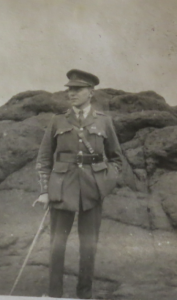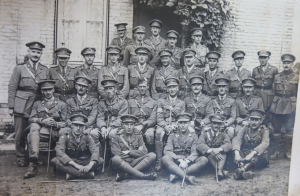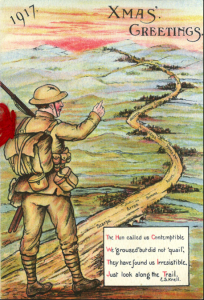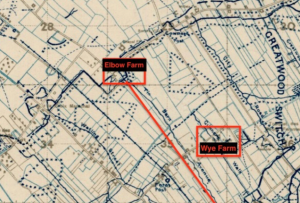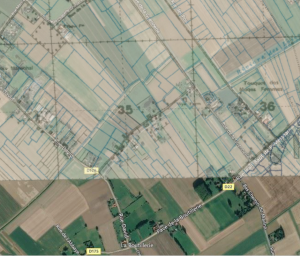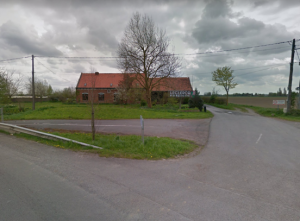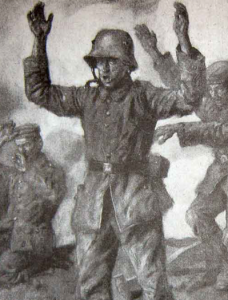Monthly Archives: December 2017
31st December 1917 Monday
A whistle-stop visit to London
All material produced or reproduced here and throughout this work is the sole copyright of the author and the family of Doctor D.C.M. Page MC
“The leave boat sailed next day (31st) at 10.30 a.m, and was very crowded. Another leave boat, and a hospital ship accompanied us across. The sea was rough, but I didn’t feel the least bit squeamish. We got into Folkestone about noon. I lunched on the Pullman en route for London, which was reached at 2.15 p.m. I tubed it across to King’s Cross, and deposited my baggage in the left-luggage office. Then I did some shopping after obtaining some money at Holt’s. The shops looked fine, and the streets were crowded. I also went to the Palladium (1st house), and saw ‘Little Tich’, Bransby Wlliams, Neil Kenyon, Ernie Lotinga etc. It was a fine show. I caught the 11.30 p.m. train from King’s Cross for Edinburgh. Managing to wangle a sleeper, I passed into the New Year – asleep! Thus began a great leave which was extended to seventeen days so that I might receive my Military Cross from H.M. King George at Buckingham Palace.”
Holt’s, founded in 1809, still provide banking services for the military from their base in Farnborough. They are today part of the Royal Bank of Scotland. In 1992 the London branch merged with Drummonds at Charing Cross.
The London Palladium opened on Boxing Day 1910 with a variety show. Charles Gulliver managing director at the time of Douglas’s visit had been managing the theatre since 1912 and directed a string of successful productions.
We think Douglas may have been mistaken about seeing the first house as it would be impossible to have visited both King’s Cross and Holt’s and then arrived at the Palladium only 15 minutes after getting off the train at Victoria. The second house would have been a better fit for his timetable.
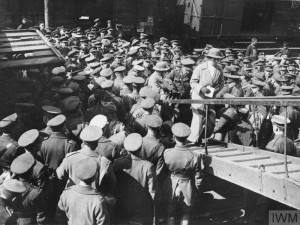
Officers waiting for the leave boat at Boulogne, 3rd April 1916. Copyright: © IWM. (Q 504) Original Source: http://www.iwm.org.uk/collections/item/object/205077558
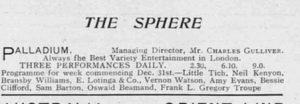
The Sphere – Saturday 05 January 1918 Image © Illustrated London News Group via the British Newspaper Archive.
Find out about our connection with Dr Page and an introduction to his diary here
30th December 1917 Sunday
Homeward bound for extended leave
All material produced or reproduced here and throughout this work is the sole copyright of the author and the family of Doctor D.C.M. Page MC
“On the 30th December I was gleefully motored to Steenwerke where I got the 11.11 a.m. leave train. As usual the journey to the coast was long and painfully tiresome. Boulogne was reached at 6 p.m. I chummed up with a Rifle Brigade officer, and we got rooms for the night in the ‘Hotel de Paris’. We enjoyed an excellent dinner at the Folkestone Hotel where we encountered a lot of American officers including General Wood.”
This was the start of 17 days’ leave for Douglas. Follow our blog to see upcoming posts as to why he was able to be away from the Front for so long.
Find out about our connection with Dr Page and an introduction to his diary here
28th December 1917 Friday
Back to the Trenches
All material produced or reproduced here and throughout this work is the sole copyright of the author and the family of Doctor D.C.M. Page MC
“On the 28th we went gladly into the trenches to get away from all these orgies of over-feeding, and late nights. We relieved the 15th R.W.F. and my aid post was in the dressing station at Bois Grenier. Capt. Dingwall of Alloa, was in charge of the station.”
The Dressing Station at Bois Grenier was in the basement of a defunct brewery, but not much more of the Christmas cheer to be had there. Although it was not as intense, the guns were not so busy, but shelling and killing continued.
Captain Dingwall was more than likely Captain Donald Grant Dingwall, a Scottish west coaster from Aultbea. For a time at least from 1911 he had settled in Alloa to where he returned after the war and died a bachelor in 1931 aged only 51.
Find out about our connection with Dr Page and an introduction to his diary here
27th December 1917 Thursday
More Feasting on The Front.
All material produced or reproduced here and throughout this work is the sole copyright of the author and the family of Doctor D.C.M. Page MC
“Then on the 27th I had to go to the Sergeants’ Xmas Splash! It was another over-feeding affair with loads of turkey and plum-pudding.”
As back in 1915 the ever popular Captain Page was invited to various Christmas celebration dinners and overindulged as a matter of duty.
Find out about our connection with Dr Page and an introduction to his diary here
Boxing Day 1917 Wednesday
Back to the old chums for a pantomime.
All material produced or reproduced here and throughout this work is the sole copyright of the author and the family of Doctor D.C.M. Page MC
“Next day I spent with the 130th Field Ambulance at Estaires. The Padre (Crosthwaite) came with me, and we had a great time. We attended a pantomime – ‘The Babes in the Wood’ – given by the 13th Welsh Concert Party in the Concert Hall. It was a marvellous show, and Sutton the organiser, was great. Then we had another Xmas dinner:- oysters, soup, fish, turkey and vegs, plum pudding, savoury, fruit, sweets and champagne, and other wines, &c. It was a great night. Col. Davies sent the Padre and I back to our Unit by car soon after midnight!”
More entertainment and another feast as 1917 was drawing to a close.
Looking back here is a photo of a group of officers of the 13 RWF. Poignantly Douglas tell us most of the men were killed at the battle for Pilkem Ridge from 31st July to 2nd August 1917, preceding Passchendaele. Douglas is 2nd left in the 3rd row standing and marked with an X.
Find out about our connection with Dr Page and an introduction to his diary here
Christmas Day 1917 Tuesday
Christmas Day celebrations.
All material produced or reproduced here and throughout this work is the sole copyright of the author and the family of Doctor D.C.M. Page MC
“It snowed heavily all day, so that we had a real old-fashioned Xmas! In the morning I paid visits to all the Companies, and also went on to Erquinghem, where some of us fore-gathered at ‘Alice’s’, and had a merry sing-song. In the afternoon all our men had a great feed in the cinema and YMCA in Erquinghem. They had a fine time, and plenty to eat and drink.
Twenty-seven of us sat down to our Xmas dinner at 8 p.m. in our cold and damp mess-room dug-out. The dinner was great, and was a credit to our cook, and his willing assistants. We had soup, fish, turkey and vegetables, plum-pudding, savoury, fruit, nuts, sweets, cigars and wines. It was a great night. The Padre got rather muddled, and hit the Colonel on the back of the head with a juicy orange! The Colonel retired after that! With speeches and songs the evening soon sped by, and we finished at midnight with a snowball fight!”
This was Douglas’s third Christmas of the war. 1915 was spent with the men of the 130th (St. John) Field Ambulance in Calonne http://whiz-bangskrumpsandcoalboxes.co.uk/2015/12/25/25th-december-1915-saturday/
1916 was with hospital patients in Bonnie Scotland http://whiz-bangskrumpsandcoalboxes.co.uk/2016/12/25/25th-december-1916-monday/
and now he is back on the Western Front in the company of the 13th Btn. Royal Welch Fusiliers for his third season of wartime festivities.
It all seemed to go very well allowing for the padre getting a little “muddled”. Muddled as newt by the sound of it.
Find out about our connection with Dr Page and an introduction to his diary here
24th December 1917 Monday
Relief for the 13th
All material produced or reproduced here and throughout this work is the sole copyright of the author and the family of Doctor D.C.M. Page MC
“We were relieved on the 24th December (Xmas Eve) by the 16th R.W.F. and sent back to Fleurbaix for 4 days. We were billeted in dug-outs in an orchard – an awful hole. The cold was intense and I couldn’t sleep at night.”
The 13th RWF had drawn the long straw in terms of Christmas away from the front line, despite their poor billet. It’s not difficult to imagine the feelings of the men heading for the trenches for Christmas in the freezing cold weather.
Find out about our connection with Dr Page and an introduction to his diary here
21st December 1917 Friday
A Duck Walk for Douglas
All material produced or reproduced here and throughout this work is the sole copyright of the author and the family of Doctor D.C.M. Page MC
“I went round the trenches and posts next day. There was hard frost, and it was tricky work walking along the wooden duck-boards. ‘C’ Company was at Elbow Farm, and by going up Tin Barn Avenue one got to ‘A’ and ‘B’ Companies. ‘D’ Company were in some rotten old houses along a road from Elbow Farm. There were a lot of guns situated between Elbow Farm and Fleurbaix which the Huns delighted in shelling.”
With Christmas looming, the miserably cold weather and snow on the ground, bombardments continued. Conditions around the trenches were pretty difficult.
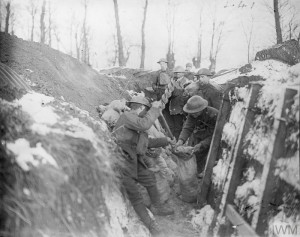
Men of the 15th Battalion Royal Welch Fusiliers (London Welsh) filling sandbags with the earth excavated from a dug-out in their trenches at Fleurbaix, 28 December 1917. Copyright: © IWM (Q 8372) http://www.iwm.org.uk/collections/item/object/205244250
Find out about our connection with Dr Page and an introduction to his diary here
20th December 1917 Thursday
‘Pork and Beans’ relieved
All material produced or reproduced here and throughout this work is the sole copyright of the author and the family of Doctor D.C.M. Page MC
“The Portuguese troops in the trenches on our right proved themselves to be hopeless soldiers. The Germans were constantly raiding them, and daily we expected the Huns to attack, and break through. All the gunners were protecting their guns with formidable barbed-wire entanglements. However, on the 20th December the whole Division (38th) side-stepped to the right, the ‘Pork and Beans’ going out, and the Australians coming in on our left. We went into trenches at Wye Farm. Headquarters was in a splendid stronghold in an old battered farm, and my aid post – a poor place, was about 100 yards off.”
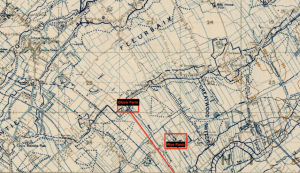
Elbow Farm, Wye Farm and Tin Barn Avenue with the area of Fleurbaix. Reproduced with the permission of the National Library of Scotland. https://maps.nls.uk/index.html
The site of Wye Farm now Y-Farm Military Cemetery
Find out about our connection with Dr Page and an introduction to his diary here
15th December 1917 Saturday
A French German gives up the fight.
All material produced or reproduced here and throughout this work is the sole copyright of the author and the family of Doctor D.C.M. Page MC
“On the 15th December a sergeant of ‘C’ company brought down to H.Q. a German who had crossed on to our lines, and given himself up. He was a strapping, young chap, aged 22, and an Alsation. He said he was ‘fed-up’ with the war, especially as he had to fight against his own people. We were relieved by the 16th R.W.F. that night, and went into support trenches. I remained with Battalion H.Q. in the support line.”
The disputed area of Alsace, west of the Rhine had fallen into German hands as a result of the Franco Prussian war of 1870. The area was contested for over 300 years before that time and in 1871 as part of the peace treaty Alsace and Northern Lorraine was annexed by von Bismark and became part of the newly united state of Germany under rule of the Kaiser. Many Alsatians had joined the German Navy during WW1 in order to avoid fighting among families, but were involved in the naval mutinies in November 1918 following the defeat of the Kaiser and Germany.
Find out about our connection with Dr Page and an introduction to his diary here
